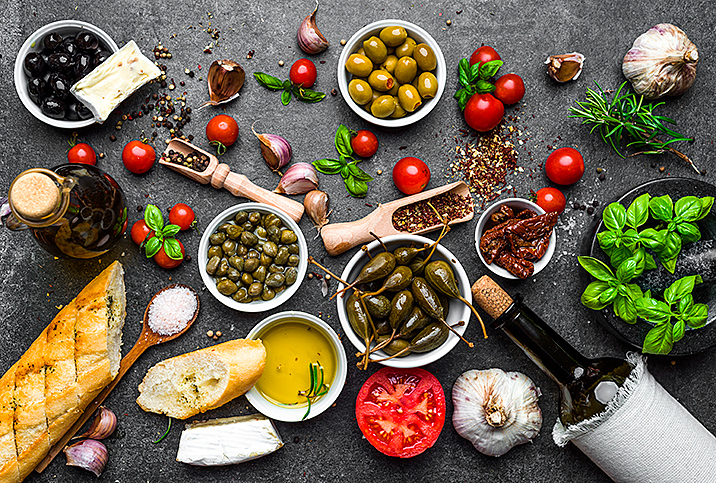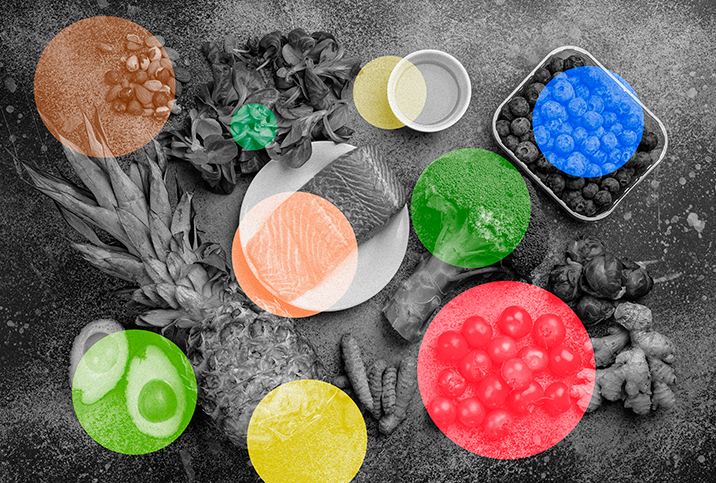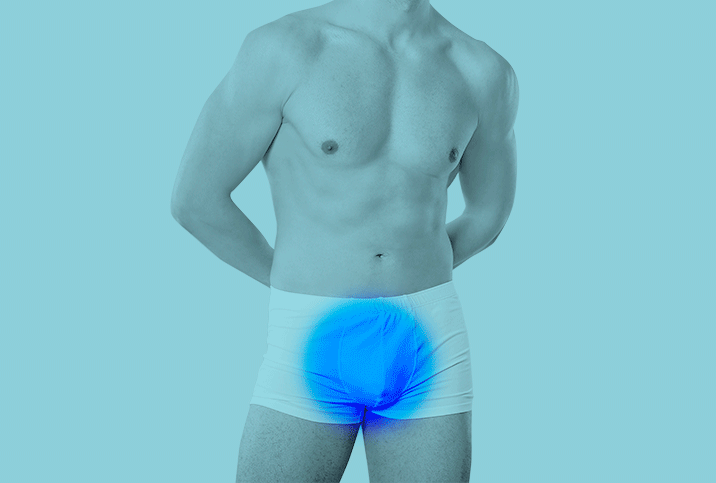The Mediterranean Diet Can Help With Diabetes (and Your Erection)

In the age of the internet, skepticism has become second nature. If something sounds too good to be true—especially health claims—it's probably fair to approach it with dubiousness. (I'm looking at you, targeted ads promising that one weird trick will help me completely empty my bowels.)
So, if you've heard the Mediterranean diet supposedly helps you do everything from maintaining a healthy weight to slowing down Alzheimer's disease to reducing the risk of cardiovascular disease, it's natural to have some reservations.
While the diet isn't a silver bullet, it has been shown to potentially provide all of the above benefits—studies on weight gain, Alzheimer's and heart disease are proof—and more, including, believe it or not, management of type 2 diabetes and improved erectile performance.
Diabetes and the diet
Erectile dysfunction (ED) probably isn't the first symptom you associate with diabetes, but it affects more than half of men with diabetes, which isn't a small number considering that of the estimated 34.2 million people with diabetes in the United States, more than half are men. ED is prevalent in this group largely because of how difficult it is for people with diabetes to keep their blood sugar levels in a healthy range. When it's too high, they produce less nitric oxide, a neurotransmitter, which plays a key role in the process of getting an erection due to its ability to facilitate blood flow.
Controlling blood sugar levels is essential for people with diabetes. Glycemia refers to the presence of glucose, or sugar, in the blood. Hyperglycemia occurs when glucose levels in the blood are too high. Hypoglycemia occurs when glucose levels are abnormally low. The hormone insulin helps control the amount of glucose in the blood. Insulin resistance can eventually lead to type 2 diabetes.
Mounting evidence indicates type 2 diabetes can be managed with the help of the Mediterranean diet. What is this diet, exactly? Angel Planells, a Seattle-based registered dietitian nutritionist (RDN) and spokesperson for the Academy of Nutrition and Dietetics, said it contains the following foods:
- Lots of vegetables, fruits, nuts, legumes, whole grains, fish/seafood and extra-virgin olive oil
- Moderate amounts of chicken, eggs, cheese and yogurt
- Low amounts of red meat, added sugars, processed meats and refined foods
Jana Mowrer, an RDN who owns HealthWins, a nutritional consulting company based in Northern California, said the Mediterranean diet has three main benefits: emphasizes whole foods; limits processed foods, especially those with high sodium and sugar; and promotes consistent and adequate food intake that supports the nutritional needs of the body.
Research on the diet's benefits
The Mediterranean diet is associated with lower HbA(1c), or hemoglobin with glucose attached, and lower levels of postprandial glucose, the concentration of plasma glucose in the bloodstream after a meal, according to a 2009 study published in Diabetic Medicine. The Mediterranean diet is also associated with better glycemic control than other diets for people with type 2 diabetes, according to a 2015 meta-analysis published in the journal BMJ Open.
Yet another study, published in 2017 in the journal Oxidative Medicine and Cellular Longevity, posited that the high level of polyphenols—compounds found in plants that act as antioxidants—consumed while following a Mediterranean diet may be responsible for reducing insulin resistance and the risk of type 2 diabetes.
Perhaps more significant are the diet's prevention mechanisms, which reduce the chances of developing atherosclerotic heart disease, hypertension and diabetes, according to S. Adam Ramin, M.D., medical director of Urology Cancer Specialists in Los Angeles.
A number of studies link the Mediterranean diet to a lower risk of developing type 2 diabetes: 2011 in Diabetes Care journal; 2008 in BMJ journal; 2010 in World Journal of Diabetes; and 2010 in Diabetes Research and Clinical Practice, among others.
"In some ways, it may even be anti-inflammatory…and all of those factors can help with well-functioning nerves and blood vessels in the body," Ramin said.
A healthy lifestyle helps diabetes and ED
Diabetes is connected to ED by two factors: blood flow and nerve damage. Over time, poorly controlled blood sugar levels can cause poor blood circulation and nerve damage in the extremities, both of which can affect the penis and erectile function.
Many of the same diet and exercise strategies that help maintain normal blood sugar can also help reduce the risk of ED.
However, Ramin and the other experts emphasized the Mediterranean diet by itself is not a treatment for erectile dysfunction, but rather part of a lifestyle that better supports erectile performance. Men suffering from ED have to take a more holistic approach.
"We have to look at every aspect of health and how a person is doing," Planells said. "Is their diet high-quality, are they being physically active, are they sleeping well, are they mentally doing well and overall in a good [place]?"
Ramin echoed the necessity of physical activity.
"[It's] important to keep in mind that a person who's on a Mediterranean diet but has a very sedentary lifestyle is not going to necessarily enjoy the benefits of that diet," he said. "People within the Mediterranean area don't have a sedentary lifestyle. They don't drive their car to work all the time. They don't drive their car to the restaurant or to go grocery shopping. These are people who generally walk a lot more than we do here in the United States."
Mowrer said men need to remember that consistent intake is the key to getting the most out of the Mediterranean diet. You can't just chow down on some branzino and olives once a week.
Still, every small step you take to improve your diet will only benefit you.
Planells shared a few suggestions:
- Incorporate more fruits and vegetables into your diet. For example, if you consume only one serving of fruit per day, make it a goal to move up to two.
- Make healthy snack choices, such as nuts and seeds, and keep them on hand for when you need them.
- Eat more fish and seafood.
- Be mindful of sodium and fat levels/types.
"Think of this as a marathon, not a sprint," Planells said. "Every little bit can help."


















